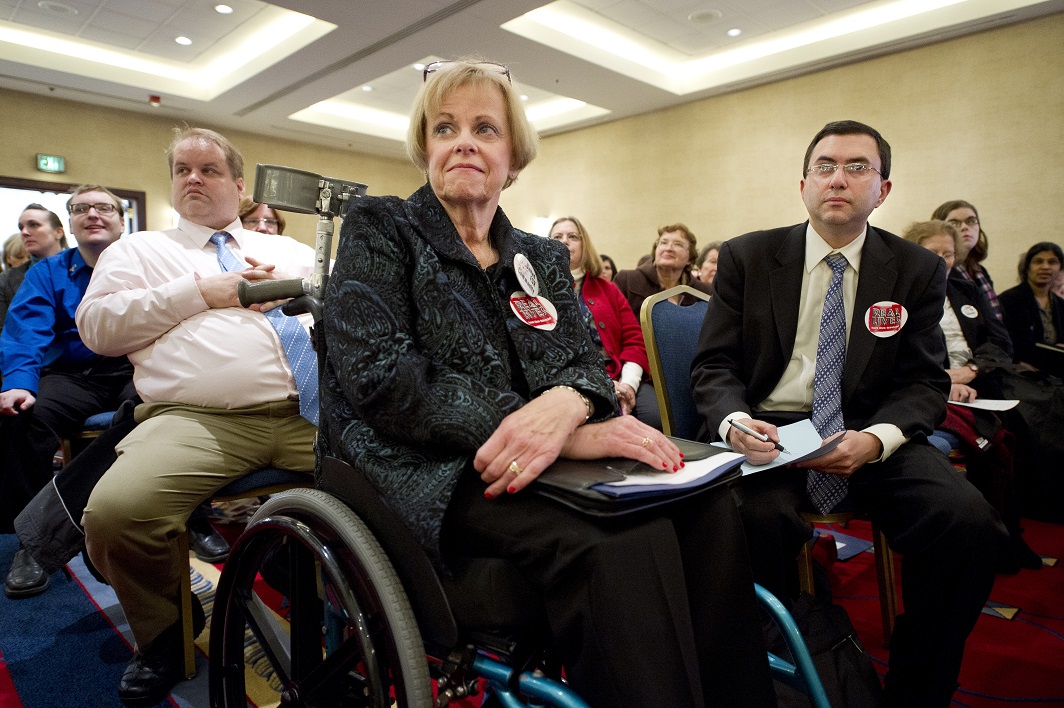By Charlie Hayward
For MarylandReporter.com
Officials at state agencies charged with helping people with disabilities often lament the enormous gap between the needs of people with disabilities and the resources Maryland has to help them.
Yet, in the latest of a series of critical audit reports of the Developmental Disabilities Administration (DDA) going back 10 years, the legislative auditor describes extensive failures to collect millions of revenues from the federal government and local jurisdictions and systematic problems that led to chronic underbilling for federal government funds.
The audit also revealed:
- overpayments to contractors;
- inadequate documentation of monitoring to assure contractors were properly providing services to the disabled;
- ineffective procedures that should be in place to find overpayments;
- vehicle purchases for disabled clients from alcohol tax revenues that didn’t follow program guidelines;
- pervasive accounting adjustments without explanation, and several weaknesses over access and security of IT data.
As a result, Office of Legislative Audits (OLA) decided that DDA’s “accountability and compliance levels were unsatisfactory” under state law. Because of the unsatisfactory rating, OLA will conduct more frequent audits; the next follow-up is scheduled in six months.

At a Maryland Developmental Disabilities Coalition meeting in 2012, signs showed some of the progress that had been made. This photo and the others below were taken by Jay Baker for MdGovPics on Flickr.
The audits are so concerning that DDA has hired a turnaround specialist, and the legislature is holding back $1 million of appropriated money until DDA finalizes a restructuring report due Dec. 1. (See the sidebar at the bottom of this article.)
DDA relies on contractors to provide hundreds of millions of dollars in services
DDA is the social-service safety net for Maryland’s developmentally disabled residents including those with cerebral palsy, Down syndrome, fetal alcohol spectrum disorders, mental retardation and others. The Department of Health and Mental Hygiene is DDA’s parent organization. They have stewardship over residential care, employment, day programs, care coordination, and respite care for family caregivers of the developmentally disabled.
In 2012, DDA spent $806 million, with almost 95% paid to contractors who delivered oversight, care and training services to 24,092 disabled persons. Service delivery is so dependent on contractors that in 2012 DDA paid $31 million to contractors for “planning, coordinating, and monitoring all services delivered” by a larger group of contractors who were paid $759 million for providing hands-on services to the disabled.
The federal government reimbursed about 45%, or $360 million, during 2012. Almost all funding came from U.S. Department of Health and Human Services (HHS) under the Medicaid program. Medicaid is a joint federal-state program to pay for health care for the poor and disabled.
Audit finds systematic underbilling and overpayments
In a report published earlier this month, the legislative auditor described 13 deficiencies, six of which had appeared in audits before.
Extensive failures to collect millions
OLA reported six different failures specifically relating to wasted resources:
- ADVANCED PAYMENTS: DDA pays service contractors before disabled clients receive their care. However, DDA gets the federal share of those contractors’ costs after care is provided and bills are sent to DDA. OLA found that service providers often did not submit timely bills to DDA or neglected to bill, which caused DDA to underbill the federal government. Between 2010 and 2012, the audit found that one-third of the federal share of DDA’s payments under one program, Individual Support Services, was not billed to Medicaid, causing at least $5.2 million of lost reimbursements. This is a repeat finding.
 OVERPAYMENTS: DDA may have overpaid service providers $4.8 million because it did not properly account for “contributions to care” payments made by disabled individuals with assets or income. Those contributions should reduce the amount DDA pays, but in some cases the state did not verify amounts of contributions reported by service providers.
OVERPAYMENTS: DDA may have overpaid service providers $4.8 million because it did not properly account for “contributions to care” payments made by disabled individuals with assets or income. Those contributions should reduce the amount DDA pays, but in some cases the state did not verify amounts of contributions reported by service providers.- UNDERESTIMATING COSTS: DDA developed a methodology to calculate how much the federal government owes for Medicaid. However, the audit found that DDA’s calculations fell short of the actual cost of care because they were based on average costs from prior years. The audit found costs were higher than bills submitted to the federal government by at least $2.4 million during 2011 and 2012 in the Individual Support Services program.
- COMPUTER ERRORS: DHMH computers erroneously removed $2.2 million of DDA expenses that might have been billed to the Federal government. Auditors identified at least $864,000 was not billed that should have been. Repeat finding.
-

Gov. Martin O’Malley greets girl in wheelchair at Maryland Developmental Disabilties Coalition meeting her addressed last year. Photo by MdGovPics on Flickr
DELAYED BILLING: Bills to the federal government were delayed by as many as 19 months because DDA’s manual systems were incapable of timely billing. The audit found this led to $262,000 of lost interest income. DDA responded to the audit by noting some of the delays were justified because providers don’t certify their attendance records until the 30th of the month following service, and error reports need to be processed after certification deadlines. Repeat finding.
- LACK OF MEDICAID DOCUMENTATION: The audit found that contractors did not always obtain documentation proving Medicaid eligibility, as required, causing the state to pay exclusively for services. Auditors found (in a small sample) 10 disabled persons whose Medicaid eligibility was terminated, causing the state to pay $252,000 for services, even though these persons may have been Medicaid eligible. DDA responded to the audit by noting that resource/service contractors were not at fault whenever beneficiaries can’t or won’t provide the needed eligibility documentation. DDA also followed up on all instances noted in OLA’s report. Repeat finding.

Disabilities Secretary Catherine Raggio and Secretary of Health and Mental Hygiene Joshua Sharfstein have been trying to fix the troubled agency for over two years.
Identified overpayments were never collected
A routine DDA audit identified overpayments in the Community Supported Living Arrangement program, which provides support to help people live in their own homes. However, the OLA audit found DDA failed to collect at least $390,000 of overpayments they identified.
Services to disabled not documented at DDA
Service providers are required to document care provided to disabled individuals. OLA found that DDA did not document its oversight of those service providers to assure the disabled received the required services. As a result, OLA could not evaluate whether disabled individuals received the required care. Repeat finding.
Vehicles purchased for crisis circumstances were outside normal guidelines
DDA bought 23 vehicles for disabled people, even though DDA policies in the Services of Short Duration (SSD) program do not provide for purchasing vehicles. The 23 vehicles cost at least $15,000 each and collectively cost $610,000. The Short Duration program was discontinued earlier this year. DDA disagreed with OLA on grounds the vehicle purchases conformed to exceptions within its written guidelines for the SSD program.
Major accounting changes made without explanation
DDA made significant changes to its accounting records but could not support or justify them. The auditor used 75 journal entries as a test. They totaled $366 million, and 74 journal entries totaling $365 million were unsupported.
Weaknesses over access and security of data
The audit found that people who shouldn’t be accessing DDA’s primary fiscal accounting platform were still able to do so. The auditor found 30 of 37 terminated employees whose system access was not deactivated, and 290 contractor employees that had system privileges greater than required by their duties. Also, three different security measures over the PCIS2 production database were inadequate, which would allow people to make unauthorized changes that “adversely affect data integrity.” Repeat finding.
Audit findings troubling for years
MarylandReporter.com has covered DDA’s woes in an award-winning series with the latest update here.
A review of OLA’s audit reports going back to January 2003 shows a drumbeat of similar problems with the same bottom line—DDA is not getting all the federal dollars it should. Criticism also came when DHMH issued results of an investigation in late 2011 where the Inspector General found major accounting problems.
DDA lost several high-level financial management personnel due to retirement or budget cuts. One new person alienated financial staff immediately after arriving, and another key person maintained “problematic” relations with her staff and DHMH’s budget office, leading to more turnover.
Staff morale was low and expertise was weak; the problem was compounded when one of DDA’s past directors withdrew from the fiscal decision process, and deferred financial decisions to these staff.
DDA accounting and control systems are disjointed, labor intensive and some are duplicative. Financial information can’t be timely processed and all information is subject to significant inherent risk of error.
_____________________________________________________________________
State hires turnaround specialist to fix DDA
In June, the Developmental Disabilities Administration hired Alvarez & Marsal under a no-bid contract. A&M specializes in turnaround management, corporate restructuring and operational performance improvement, and has assisted other troubled governments including the city of Harrisburg, Pa. and Detroit Public Schools.
Without comment, the Board of Public Works — the governor and state treasurer with Comptroller Peter Franchot absent — approved the $3.1 million contract retroactively in September, justifying the emergency out of concern that “failed implementation could compromise services for thousands of individuals with disabilities and millions in federal matching funds.” The emergency modification added a project team to provide direct assistance to DDA in day-to-day fiscal and program management.
A long road ahead
Fixing these problems will require much work over several years. The evidence indicates top management is serious about corrective action.
Last month, Dr. Joshua Sharfstein, the health department secretary that oversees DDA, wrote an op-ed in the Baltimore Sun in which he said:
“Our commitment to Marylanders with disabilities includes rooting out and addressing challenges within the DDA. Over the last several years, we have uncovered significant administrative and financial weaknesses in the agency.”
“In June, I appointed a new acting director for the DDA, and we executed a contract for expert support from a national firm with experience turning around agencies that serve individuals with developmental disabilities. This new team is capable of identifying and understanding the many challenges facing our system and taking action to address them.”
A&M’s emergency contract will cost $175,000 a month through December 2014.
Another A&M contract for study and document current business processes, leading to recommendations about the IT systems will cost $2.4 million through end of 2015. Both contracts will be funded in part by the U.S. Department of Health and Human Services.
Once these contracts are complete, DDA will likely need to pay millions for a financial-systems overhaul. Meanwhile, the legislature is holding back $1 million of appropriated money until DDA finalizes a restructuring report due December 1.
The health department released a preliminary report to MarylandReporter.com.
“This report reflects the initial assessment from the new leadership team of the challenges facing DDA, reviews the interim steps taken thus far, and sets out the path forward over the next 12 months,” the report says.
Charlie Hayward recently retired after 30 years’ experience with performance, IT, and financial auditing of a wide variety of government programs and activities. He can be reached at hungrypirana@verizon.net.









“23 vehicles cost at least $15,000 each and collectively cost $610,000”
23 multiplied by 15000 equals 345000, not 610000.
Where’s the push from so called “advocates” like Vinny DeMarco? Marylanders were sold a bill of goods by O’Malley, Miller & Busch as the justification for raising alcohol taxes. More tax dollars, whether from the Feds or from Annapolis haven’t solved the issues, yet I don’t see or hear those state officials responsible for straightening out this bloated mess in the local MSM. Thanks Maryland Reporter for keeping a watchful eye on this mess.